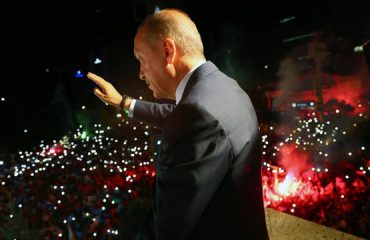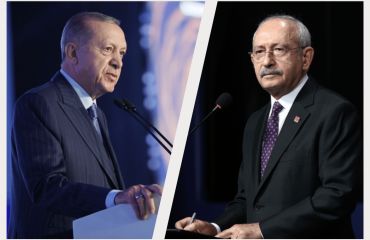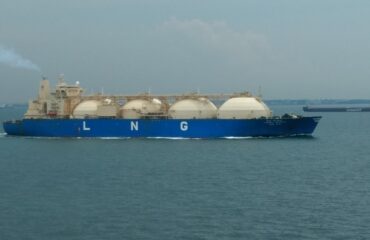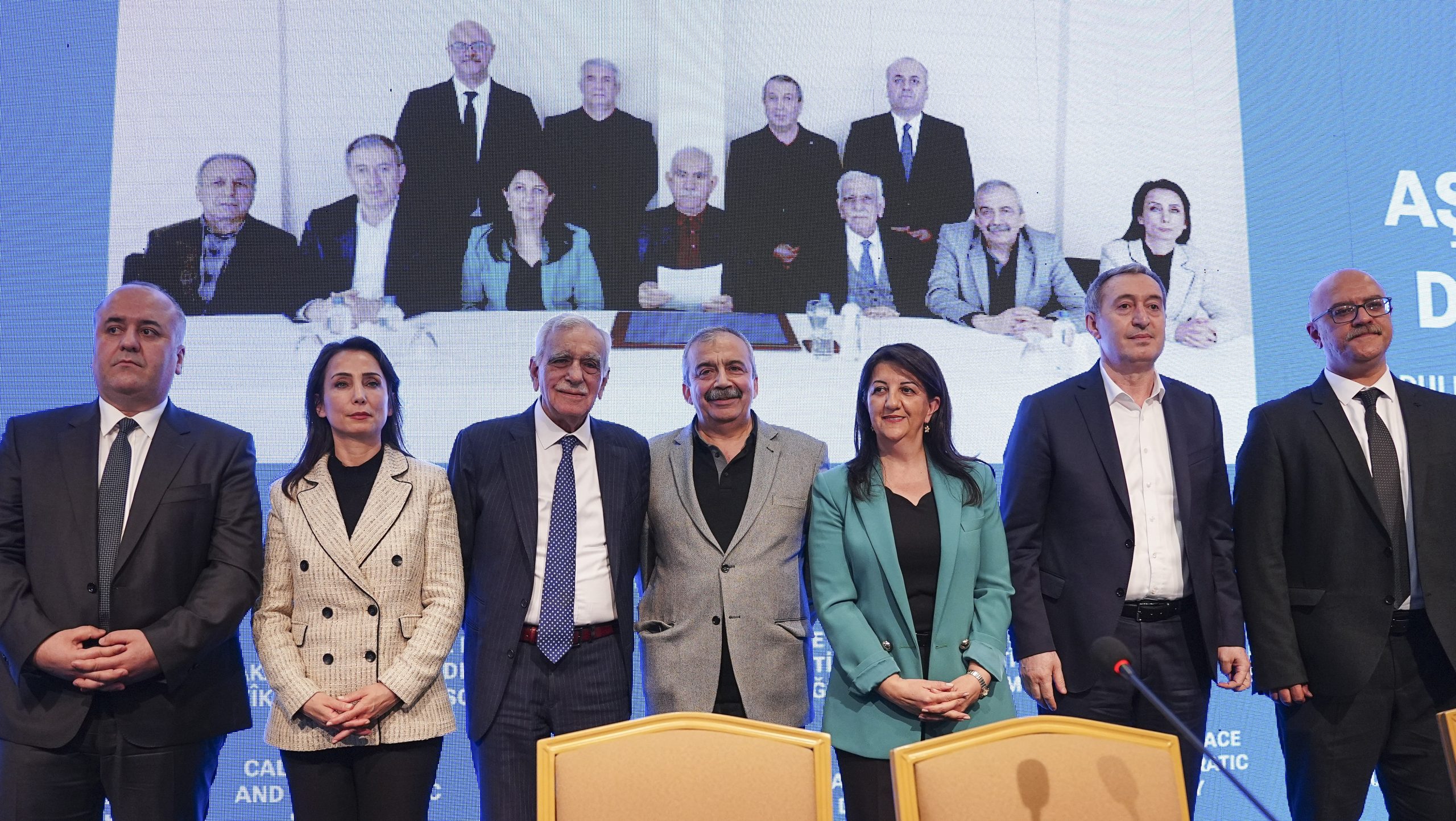
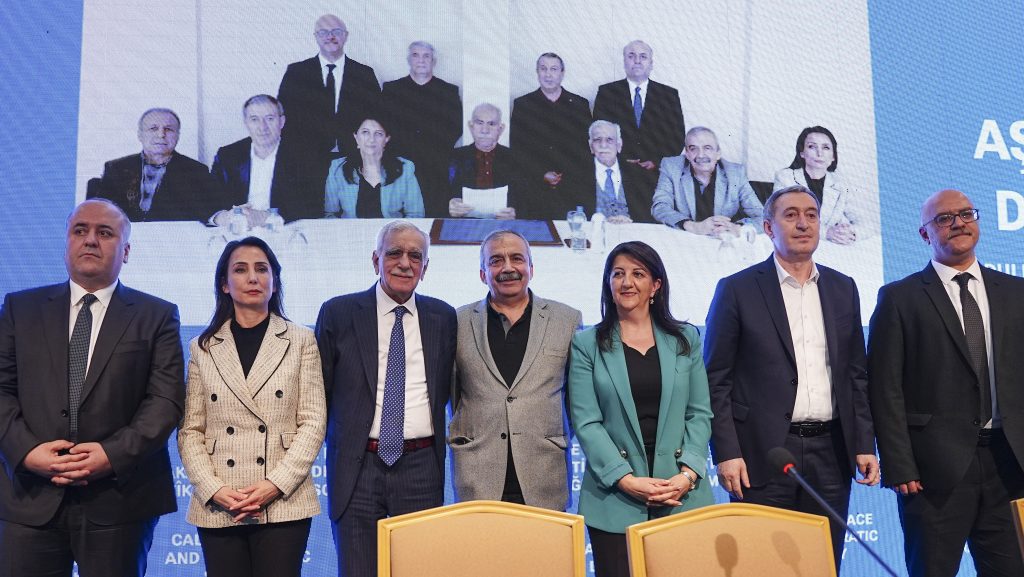
The DEM Party delegation, who conveyed and announced Öcalan’s call for the PKK to disarm and dissolve from İmralı, is seen in front of their photos at İmralı following the announcement. Although there’s still a long road ahead, the most difficult obstacle has been cleared. (Photo: Anadolu Agency)
The most challenging hurdle was Abdullah Öcalan—who founded the PKK nearly half a century ago—declaring that the organization has run its course and should lay down arms and dissolve itself.
This critical threshold was crossed when the pro-Kurdish Peoples’ Equality and Democracy (DEM Party) delegation, visiting İmralı for the third time on February 27, clearly and unambiguously presented these three elements in their statement in Istanbul after spending four hours with Öcalan.
Now attention turns to what response will come from the Kandil Mountains in Iraq, where the PKK’s main headquarters is situated. The most senior figure in Kandil is Cemil Bayık, the only person who was present with Öcalan at the PKK’s founding in 1978 and remains alive and by his side today.
Will they follow Öcalan’s instructions, convene a Congress, end armed struggle, and decide to dissolve the PKK? Or will paths diverge? This represents the second hurdle. If they agree, will all militants—whose numbers have swelled to tens of thousands, especially since their cooperation with the US during the Syrian civil war—comply?
Assessments in Ankara suggest that even if the PKK follows Öcalan, more radical breakaway factions could emerge from the organization; preparations for this contingency appear to be underway.
Several hurdles remain
This is a crucial detail. “The hope for democratic and legal steps” from the government, a message conveyed by Sırrı Süreyya Önder from Öcalan at the end of the press statement, seems unlikely to materialize until this hurdle is cleared.
Because another threshold remains between. AKP Vice Chairman Efkan Ala said “What matters is the outcome, and we will judge by results.” In other words, the PKK must declare compliance with Öcalan and actually disarm and disband. Only then will the government take its own steps, with parliamentary stages still to follow, it seems.
But the hardest part has been overcome. Though much ground remains to be covered, a turning point has been passed.
It resembles an acknowledgment of defeat
It’s more accurate to interpret this statement as an acknowledgment of defeat, or at least an opportunity for a bloodless conclusion, rather than a reconciliation document. I don’t mean this negatively; if the several thresholds mentioned can be crossed in the coming weeks and months, then genuine steps toward domestic peace can begin.
We can understand this by carefully analyzing Öcalan’s call as read by the DEM Party members.
Let’s start with the timeline. The date under Öcalan’s call—the handwritten original of which appeared on social media—is February 25, 2025. The DEM members went to İmralı, received the letter, and announced it on February 27. The two-day delay likely stems from vetting by experts in the Justice Ministry, MIT (National Intelligence Organization), and other state institutions to check for ambiguous wording or expressions with potential dual meanings.
The entire text can be divided into three parts:
1- The conditions and reasons for the PKK’s establishment
2- Self-criticism and the determination that it has “completed its lifespan”
3- The reasoned decision to end
Harsh self-criticism
Öcalan traces the PKK’s founding rationale to the existence of the Soviet Union, which he calls “real-socialism,” the Cold War with the US, and the banning of Kurdish language and the “Kurds do not exist” propaganda during the military coup periods of 1971 and 1980. He explains how “the PKK, the longest and most comprehensive rebellion and violent movement in the Republic’s history,” gained power and support through the closure of democratic political channels. He also attributes their adoption of a Marxist-Leninist party program when founding the PKK to the “heavy influence of the real-socialist system reality”—meaning the Soviet Union and Moscow.
With this, he transitions to the self-criticism section.
He characterizes developments from the Soviet collapse in the 1990s and the start of Kurdish music and publication sales during Turgut Özal’s era to the establishment of a Kurdish channel on TRT during Tayyip Erdoğan’s period as “the dissolution of identity denial in the country.”
For Öcalan, this marked a threshold. The ceasefire process, disrupted by the killing of 33 soldiers in 1993, had begun to trend in this direction after the Soviet collapse, but he abandoned it under the influence of external actors—such as Syria, Greece, and Iran. Öcalan now claims that failing to properly evaluate these developments after 30 years and tens of thousands of deaths has led the PKK to “complete its lifespan” by falling into “meaninglessness and excessive repetition.”
Abandoning Kurdish independence
Perhaps one of the most striking aspects of Öcalan’s call for the PKK to disarm and dissolve is his abandonment of demands such as independent Kurdistan, federation, and administrative autonomy—which he refers to as the “separate nation-state” concept—alongside his self-criticism of “excessive nationalist deviation.” Öcalan now states that these “cannot respond to historical social sociology.” In fact, with his characterization of “culturalist solutions,” he appears to include even the demand for Kurdish as a mandatory language of education.
These were demands that defined the PKK alongside armed attacks for half a century. Their rejection by the organization’s founder must certainly be considered the most significant threshold from their perspective.
Öcalan’s discourse that the West wants to break up Kurdish-Turkish relations, which have “exceeded a thousand years,” for the last 200 years due to “capitalist modernity,” is not much different from the official discourse.
Partly for these reasons, I think it’s more accurate to view this text not as a negotiation or reconciliation, but rather as an opportunity for a bloodless conclusion—essentially, a surrender document.
Request for a bloodless conclusion
At this point, we come to Öcalan’s demands from the government—not as conditions for disarmament and dissolution, but aligned with the discourse of all mainstream parties from AKP to CHP about “crowning the Republic with democracy.” This section begins with “The need for a democratic society is inevitable” and concludes with “There is no non-democratic path for system exploration and implementation. There cannot be. Democratic reconciliation is the fundamental method.”
The call for the PKK to disarm—what we termed “the most difficult threshold”—which began in government with MHP leader Devlet Bahçeli approaching and shaking hands with DEM Party members at the parliamentary opening on October 1, 2024, follows this:
“I am calling for disarmament in this climate created by Mr. Devlet Bahçeli’s appeal, the will demonstrated by the President, and the positive approaches of other political parties toward the aforementioned call, and I assume the historical responsibility for this call.”
“As any contemporary organization and party whose existence has not been forcibly terminated would voluntarily do, convene your congress and make a decision for integration with the state and society; all groups should lay down arms and the PKK should dissolve itself.”
The phrase “whose existence has not been forcibly ended” likely implies, in Öcalan’s complex terminology, that if they don’t dissolve themselves, Türkiye possesses the military capability to forcibly eliminate them.
Bahçeli’s key role
Recall the pro-government media’s “CHPKK” rhetoric merely because CHP engaged with the DEM Party before and after the 2024 elections. In such an atmosphere, from whom other than Bahçeli—the leader of the MHP, which has become synonymous with Turkish nationalist ideology—could the Öcalan Initiative have come without facing severe backlash?
He made a move that caught everyone off guard. He and President Erdoğan almost played a “good cop, bad cop” routine; Erdoğan never directly took ownership of the project, contenting himself with supporting Bahçeli.
Bahçeli’s initiative also aimed to attract the DEM Party Parliamentary Group to support Erdoğan’s potential renewed presidential candidacy and constitutional amendments. Indeed, İYİ Party leader Müsavat Dervişoğlu views the entire process as a “bargain for Erdoğan’s lifetime presidency” and opposes it. It’s also significant that CHP Chairman Özgür Özel, currently experiencing major tensions with the government, stated, “The call for the terrorist organization to lay down arms and dissolve itself is important. (…) We are aware of our responsibility for the solution”—a stance that deserves appreciation.
If this process continues and the government’s vision of “Turkey Without Terrorism” materializes, it will represent a significant milestone for Turkey in the turbulent landscape of international politics.
So far, only the first and most important stage has been completed.
